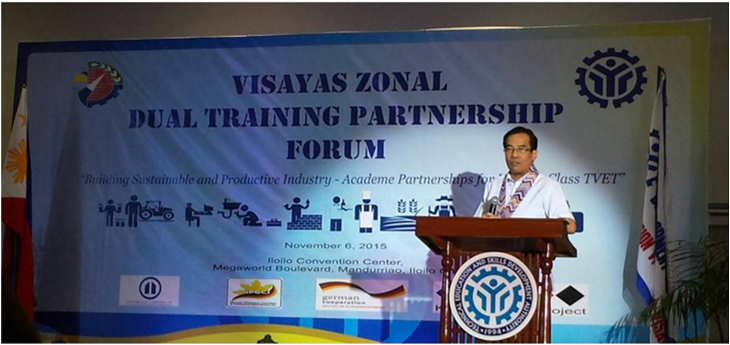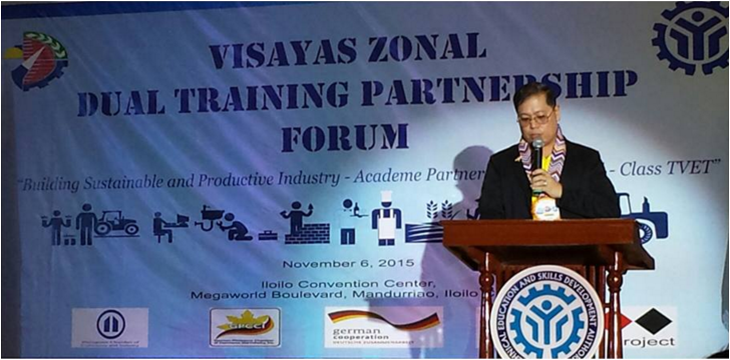18 November 2015
At the Visayan Zonal Partnership Forum, the Technical Education and Skills Development Authority (TESDA) focused the spotlight on the value and opportunity of the Dual Training System (DTS).
DTS helps trainees upgrade their skills to keep pace with the demands of the modern workforce. At the same time, it provides companies with the exact skills they need.
Irene Isaac, TESDA Director General, exhorted companies and private businesses to participate in the DTS and contribute in the skills development of the Filipino workers.
"DTS is one of the best ways of skilling up the next generation vital to the country’s social and economic future. Let us support dual training that will help educate more people and make them valuable assets to the company, their families and communities,” Isaac said.
“TESDA wants to make sure that the Philippine technical vocational education and training system is in sync with the industry to be able to produce globally competitive human resources that are flexible and adaptable in the changing work environment. A potent strategy is the establishment of partnerships between schools and companies to bridge the supply and demand gap in the country’s labor market,” she added.
The forum saw one of the biggest gatherings of technical vocational schools and companies in the region with close to 300 participants.
Held at the Iloilo Convention Center, the event was the last of the three series of partnership fora geared towards strengthening and sustaining industry-academe partnerships, particularly in the effective implementation of DTS.
This is one of the activities being implemented as part of the PCCI-TESDA Tech-Voc Project (PTTP). The project was formalized through a Memorandum of Agreement between TESDA and the Philippine Chamber of Commerce and Industry that aims to promote, facilitate and assist business chambers, industry and trade associations, as well as individual enterprises to conduct skills training and be engaged in tech-voc.
The Luzon Zonal Partnership Forum was held in February at the TESDA Women’s Center in Taguig City, while the Mindanao Zonal Forum was conducted in Cagayan de Oro in May.
Patterned after the German model, DTS is an instructional mode of delivery for technology-based education and training in which learning takes place alternately in two venues: the school or training center and the company. It was institutionalized through the enactment of R.A. 7868 or the Dual Training System Act of 1994.
In his message during the opening program, Iloilo Mayor Jed Patrick Mabilog said the DTS should be made a central pillar of the training system to enhance the employability of the graduates.
“Most economies are looking for ways to improve the shift between school and employment, and the Philippines, for one, is increasingly turning its sights on the preferred modality of transition that is the Dual Training System,” he said.
Teodoro Pascua, TESDA deputy director general, said intensifying the academe-industry linkages will revitalize and bolster the implementation of the DTS, which will give Filipino trainees the edge in the global market.
TESDA Region 6 organized the forum in collaboration with the German Philippine Chamber of Commerce and Industry, Philippine Chamber of Commerce and Industry, Capiz-TESDA Schools Association Inc., Association of Technical Institutions of Negros Occidental and TESDA Supervised Schools Association of Iloilo.


TESDA Deputy Director General Teodoro C. Pascua (in photo above) and Iloilo City Mayor Jed Patrick E. Mabilog led the opening ceremony of the Visayas Zonal Dual Training Forum held at the Iloilo Convention Center. The Forum was organized by TESDA Region 6 in collaboration with the German Philippine Chamber of Commerce and Industry, Philippine Chamber of Commerce and Industry and the associations of TVET institutions in the region with the objective of promoting school-industry partnership through the Dual Training System.
Share this page





